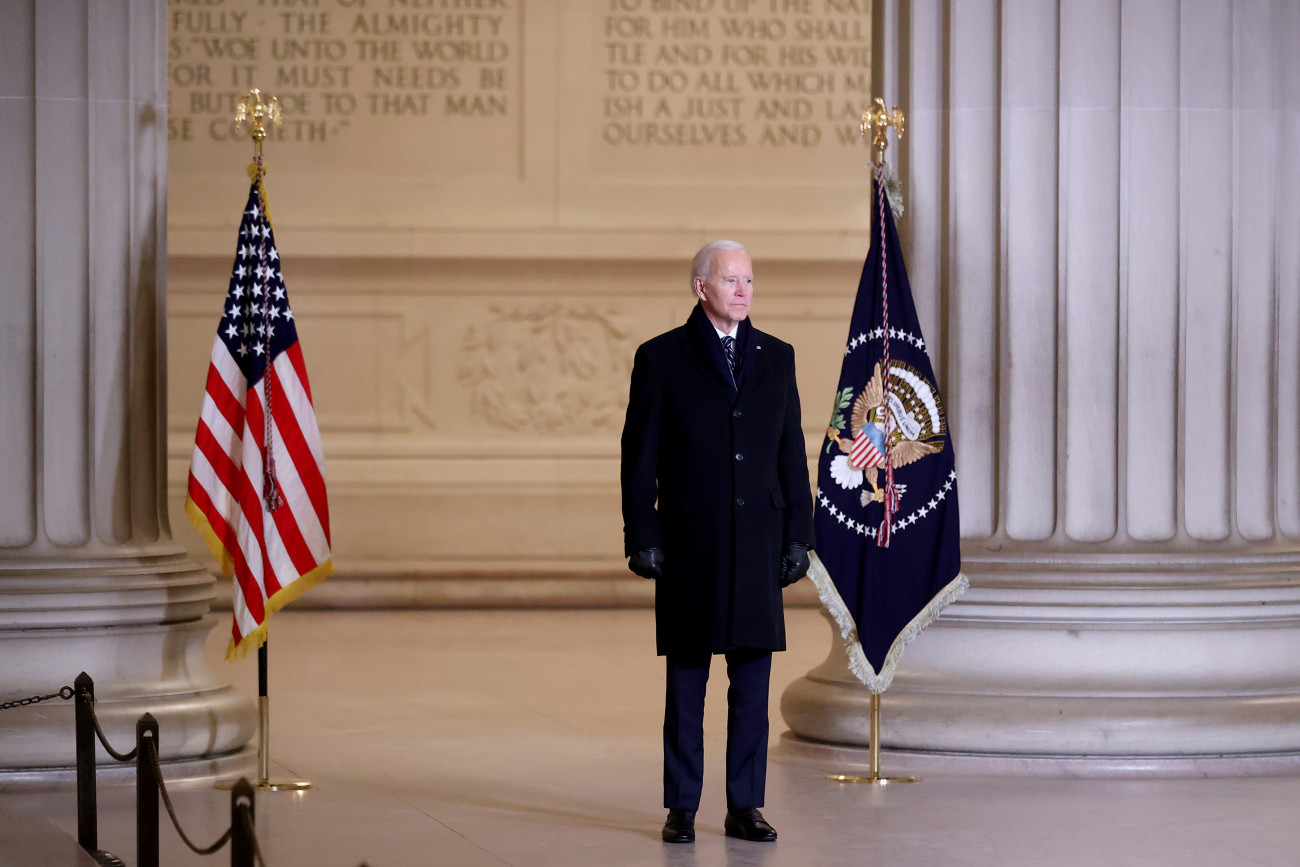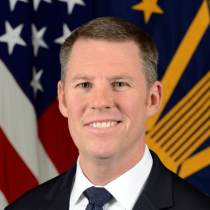

Introduction
At the end of Joe Biden’s first 100 days as president of the United States, where do things stand when it comes to U.S. policy toward the Middle East and North Africa? We asked experts and scholars from across MEI to weigh in with their thoughts on the changes we've seen so far, the new challenges that have emerged, and what we know about the administration's key priorities for the region.
Viewpoints
-
Paul Salem
Paul Salem

The two big moves in early US Middle East policy
Three months is a very short time, especially in the life of a new administration scrambling to fill positions, review policy, and launch initiatives. And although the incoming administration’s priorities are largely domestic — and in the foreign policy arena, their priorities are on global issues like climate change and fighting COVID or otherwise on China and Asia — Middle East policy has seen important movement, particularly on Iran and Afghanistan.
The decision to find a pathway back into the Joint Comprehensive Plan of Action (JCPOA) with Iran was signaled loudly during the campaign, and it has translated into indirect talks in Vienna. Predictably, Iran has been testing the new administration with limited escalations in various theaters, partly to take the measure of the new president, and partly as a way to gain leverage in the negotiations. Despite their wide differences, the American and Iranian “administrations” both have an interest in returning to the JCPOA. The contested areas that will be the subject of tension between Washington and Tehran will focus on two issues: will Iran accept any additional conditions on its nuclear program or on its missile program and its regional interventions, and how many sanctions will the U.S. be willing to lift. At the end of the day, I expect a largely bare-boned return to the JCPOA with minimal changes and a limited lifting of U.S. sanctions, with little progress on other issues. Iran will pocket the partial lifting of sanctions to ease its domestic socio-economic squeeze and to consolidate its investments in proxy militias around the region. Once back in the JCPOA, the Biden administration will have ticked that box and reduce its interest in Iran and the regional proxy conflicts that it, and others, are involved in.
The decision to withdrawal all U.S. troops from Afghanistan by Sept. 11 of this year was an understandable one given repeated pledges to end America’s forever wars, but it might come back to haunt the administration in a major way. The pullout of U.S. forces — and other NATO forces as a result — will further weaken the fragile central government in Kabul and greatly empower and embolden the Taliban. The so-called “deal” between the U.S. and the Taliban will have little bearing on the latter’s attempt to retake the country by force. The Taliban might “play nice” and keep Afghanistan from becoming a haven for groups planning attacks on the U.S, but then again they may not. I’m not sure that giving that choice and leverage over the U.S. to the Taliban was the wise choice to make, as opposed to maintaining a quite limited and sustainable presence in the country. The Afghan pullout might prove similar to the withdrawal from Iraq in 2011; it had a “feel good” factor initially, but the U.S. was forced to send troops back in after ISIS took advantage of the power vacuum. It is also surprising that the administration chose Sept. 11 as the date of withdrawal. The U.S. defeat and retreat from Afghanistan will already be leveraged as a historic victory by the global jihadist movement, and will give them renewed energy and recruiting power; to conclude the defeat and retreat on the anniversary of the original attack feeds perfectly into the symbolic narrative of the jihadists and the original attackers.
Paul Salem is president of the Middle East Institute.
-
Alex Vatanka
Alex Vatanka

Iran pushes forward with talks amid pressure and counter-pressure
By and large, the Iranians did not anticipate the Biden administration would upend Donald Trump’s “maximum pressure” campaign overnight, but they had hoped for a faster and smoother dialogue. A hundred days into the new administration and almost all of the sanctions that Trump imposed on Iran are still in place. Unsure about the depth of Joe Biden’s commitment to rejoin the 2015 nuclear deal, the Joint Comprehensive Plan of Action (JCPOA) — and knowing full well about the stiff opposition in the U.S. Congress to anything that looks like giving Iran a pass — Tehran chose not to meet the Biden team face to face and has preferred to use the Europeans, Russians, and Chinese as interlocutors to provide cover in the context of new rounds of negotiations that began in mid-April.
All along, Tehran has faced a twin challenge: how to pressure Washington to rejoin the JCPOA without succumbing to American pressure to broaden the original deal to include other U.S. concerns, like Iran’s ballistic missile program or its regional agenda. Tehran’s counter-pressure has come in various forms, from seizing a South Korean ship in the Persian Gulf in January to exhibit its capacity to be a menace, if necessary, to ramping up uranium enrichment to 60% to show the invincibility of its nuclear program to threatening to quit the Nuclear Non-Proliferation Treaty (NPT), and even hinting at assembling a nuclear bomb.
And yet, Tehran has not at any point seriously contemplated quitting the JCPOA. This is rooted in a hard reality: the revival of the JCPOA, accepted and implemented by the rest of the world, is Iran’s only hope to return to anything like normalcy on the international stage. With an economy in freefall and a restless population that above all blames the authorities in Tehran for the country’s pariah status, Iran has no choice but to push ahead in the hope of resuscitating the JCPOA. That will at least buy Iran some time to reflect on its longer-term foreign policy aspirations.
As evident in leaked comments made by Foreign Minister Mohammad Javad Zarif, the Iranian authorities hardly see eye to eye on foreign policy priorities. In short, what the Iranian state as a whole has managed relatively well is to prevent the process of tit-for-tat against the U.S. and its allies from getting off the rails. What Tehran has failed to do so far is to take advantage of the new momentum arising from the talks in Vienna to prepare the ground for a qualitatively different approach to the American question should the JCPOA be rescued. Only a broader process of rapprochement with Washington can make a new nuclear deal into a sustainable one.
Alex Vatanka is the director of MEI's Iran Program and a senior fellow with the Frontier Europe Initiative.
-
Mick Mulroy
Mick Mulroy

Middle East defense and security policy in the first 100 days
As highlighted in the “Interim National Security Strategic Guidance” released at the beginning of March, the first 100 days of the Biden administration saw a shift from the unilateralism of the previous administration’s toward greater international cooperation and multilateralism in some areas and less direct American military engagement in others.
In the Middle East and Central Asia, this can be seen in the new attention given to an international effort to end the conflict in Yemen and the desire to engage with Iran and potentially reenter the Joint Comprehensive Plan of Action (JCPOA), but also in the decision to withdraw all forces from Afghanistan over the objection of senior military leadership.
Yemen
The withdrawal of U.S. military support to the Saudi-led coalition’s efforts in Yemen did not come as a surprise. That support was minimal, and the withdrawal may have little impact on the conflict. If it does reinforce the position that there is no military solution to the civil war, that is a good thing, but it does not absolve the U.S. of responsibility to be part of the effort to end the war.
We must follow that decision by taking an international leadership role to gain and maintain a cease-fire and develop a plan to take Yemen from a failed to a fragile and eventually a functioning state. Appointing Tim Lenderking as the U.S. special envoy for Yemen was a good step in that direction paired with U.N. Special Envoy Martin Griffiths.
Iran
The new administration was correct in responding to attacks by Iranian-backed militia against our forces in Iraq and carrying out those responses with airstrikes in Syria. This action demonstrated to Iran that there would be consequences to their use of proxy forces against us and avoided the consequences of escalating the situation in Iraq by responding in Syria.
The JCPOA was not a perfect agreement, but since our decision to withdraw, Iran has surpassed the limits on enrichment and storage, despite the sanctions. Current negotiations on the JCPOA should seek to get back to an agreement that stops Iranian ambition to gain nuclear weapons and stops the malign activity that the Islamic Revolutionary Guard Corp (IRGC) and the Ministry of Intelligence and Security (MOIS) conduct throughout the region.
Afghanistan
Although it is understandable to want all of our forces to return from Afghanistan after almost 20 years of fighting, we should not do that at the potential expense of everything we have gained. We should keep between 3,500 and 4,500 of our forces there to maintain our counter-terrorism efforts and enable our partners in their fight against the Taliban, the same group that provided al-Qaeda a safe haven before Sept. 11, 2001.
We should also ensure that those who fought alongside us are not forgotten. If the Taliban continues to take territory, they will likely seek retribution against those that stood against them and next to us. There should be special consideration given to those individuals should they seek asylum in our country.
Mick Mulroy is a senior fellow and co-director of the Yemen Steering Initiative at the Middle East Institute, former deputy assistant secretary of defense for the Middle East, retired CIA paramilitary officer, and co-founder of the Lobo Institute.
-
Fatima Abo Alasrar
Fatima Abo Alasrar

Promising signs of engagement on Yemen, but more needs to be done
More so than any other country in the region, Yemen has received particular interest from the Biden administration. Within Joe Biden's first 100 days in office, he has communicated the need to end the military support for Saudi Arabia (leaving the door open for defending the kingdom) and pushed for peace in Yemen, as well as de-listed the Houthis from the terrorist designation that the Trump administration imposed. He has also appointed Tim Lenderking as a special envoy to Yemen, bringing momentum to the importance of the peacemaking process for the country.
The response to this thrust by the current administration to resolve Yemen's conflict has been mixed. On the one hand, the Saudis seemed keen to cooperate, presenting a peace initiative in which they made several concessions to the Houthi rebels; on the other hand, the Houthis intensified their military campaign in the Marib governorate and continued their brazen attacks against the kingdom. This has brought attention to the challenge that the U.S. administration faces in resolving Yemen's war, which is how to get the Houthis to cooperate when there is no leverage.
However, what is different here is that the Biden administration shows promising signs of engaging on a granular level on this conflict, demonstrating the limits of its tolerance for the Houthis' actions. The U.S. Department of Treasury blacklisted two Houthi leaders for their role in orchestrating attacks on the Yemeni people, the region, and in international waters. It recognized that these actions were taking place to "advance the Iranian regime's destabilizing agenda." The U.S. has also addressed the Houthis’ military provocations and expansion with France, Germany, Italy, and the United Kingdom issuing a statement condemning the Houthis' offensive on Marib and the escalation against Saudi Arabia. This was a reassuring gesture for many Yemenis, whose local issues are often overshadowed by political calculations tied to either Saudi Arabia or Iran.
However, more needs to be done. The Biden administration has successfully managed to put pressure on Saudi Arabia, and now it needs to put pressure on Iran to stop arming and assisting the Houthis. The Biden administration must re-evaluate the Joint Comprehensive Plan of Action based on Iran's compliance if it is keen on seeing a resilient peace process in Yemen that would empower Yemeni civilians and enable them to live in a more stable country. Although an end to the conflict may not be as quick as Biden has promised, maintaining a balanced focus on reducing the Saudi role while supporting a local peace process that would protect Yemeni civilians from Iran’s destructive influence and the Houthis’ violence is an important step toward ensuring stability for the war-torn country.
Fatima Abo Alasrar is a non-resident scholar at the Middle East Institute.
-
Gerald Feierstein
Gerald Feierstein

Biden strikes a balance in Gulf relations, but is it sustainable?
After campaigning in 2020 on a platform that promised a dramatic change in approach to the Gulf, offering harsh criticism especially of both Saudi domestic and foreign policies, the first 100 days of the Biden administration have seen generally nuanced policy decisions. Most notably, the administration decided on a relatively mild response to the release of the Intelligence Community’s (IC) report on the Jamal Khashoggi murder. While sanctioning a number of lower ranking Saudi officials over the murder, and despite a clear determination by the IC that the decision to kill the Saudi journalist could not have happened without Crown Prince Mohammed bin Salman’s (MbS) knowledge or approval, MbS himself was not sanctioned. Similarly, even as President Joe Biden followed through on a campaign pledge to declare an end to U.S. support for the Saudi-led coalition’s military operations in Yemen, the decision was paired with a reiteration of U.S. commitment to sustain the long-standing U.S.-Saudi defense relationship. The administration’s approach to Saudi engagement in the Yemen conflict allowed Riyadh to respond positively to the president’s declaration and offer its own proposal to end the conflict.
The low-key administration approach to its Gulf policy has, for the most part, been matched by the Gulf states themselves. Unlike the Israelis, for example, there has been little regional reaction to the administration’s policy changes either in Yemen or with regard to a return to the Joint Comprehensive Plan of Action (JCPOA). The reduction in tension between Qatar and its Gulf Cooperation Council (GCC) neighbors, facilitated by the al-Ula agreement reached immediately before President Biden took office, has also allowed the administration to sidestep involvement in intra-GCC affairs.
Despite the relative calm in U.S. relations with the Gulf states, potential pitfalls remain. While the Gulf states have been relatively silent on U.S. outreach to Iran, perhaps mitigated in part by the fact that the Saudis and Emiratis have also been engaged in talks with Tehran, Gulf anxiety may rise should Washington and Tehran reach an agreement. This would be especially the case should an agreement on a return to the JCPOA appear once again to avoid tackling the other issues of Iranian behavior of greatest concern to the Gulf states. Although the Gulf states have also generally remained silent on President Biden’s decision to end U.S. military engagement in Afghanistan, if this translates into generalized concern about Washington’s broader commitment to sustain its long-standing security presence in the region, or if an Afghan security vacuum is filled by a renewed foothold for violent extremist groups, that, too, could lead to fissures in U.S. regional relations.
The nature of the U.S. defense and security relationship with the Gulf, especially with Saudi Arabia and the UAE, remains a potential complicating factor in the U.S. relationship with the region, although the challenge may come more from Congress than the administration itself. President Biden’s pledge to maintain defensive weapons sales to Saudi Arabia while ending offensive sales has generated some confusion about the line to be drawn between the two elements. That has been potentially exacerbated by recent moves in Congress to threaten arms sales to Riyadh unless the administration certifies that the Saudis are not oppressing political dissidents. Likewise, after initially blocking a planned sale of F-35 aircraft and other advanced weaponry to the UAE announced at the end of the Trump administration, the Biden administration has now signaled that it will allow the sale to proceed. This is likely to generate some controversy on Capitol Hill. Political battles over these sales, even if they ultimately survive congressional scrutiny, could raise new tensions in the administration’s approaches to traditional friends in the region.
Amb. (ret.) Gerald Feierstein is senior vice president at the Middle East Institute. He previously served as the U.S. ambassador to Yemen and principal deputy assistant secretary of state for Near Eastern affairs.
-
Charles W. Dunne
Charles W. Dunne

On human rights, the administration is still trying to live up to expectations
The Biden administration set a high standard for itself when it promised a foreign policy “centered on the defense of democracy and the protection of human rights.” As a candidate, Joe Biden had vowed to treat Saudi Arabia as a “pariah,” and insisted there would be "no more blank checks for Donald Trump's 'favorite dictator,’” Egyptian President Abdel-Fattah el-Sisi.
One hundred days on, the administration is still trying to live up to expectations.
Biden quickly fulfilled a campaign promise to lift Trump’s “Muslim ban,” and in early February his administration announced it would seek re-election to the U.N. Human Rights Council, which Trump abandoned in 2018. More substantively, Biden ended U.S. support for the Saudi-led war in Yemen.
But there have been serious disappointments as well. The administration walked back its pledge to lift the ceiling on refugee admissions, leaving in place the limit of 15,000 set by Trump, a 40-year low. While the administration made public a U.S. intelligence report on the murder of Jamal Khashoggi that made clear Crown Prince Mohammed bin Salman (MbS) was responsible for ordering the killing, Biden refused to sanction MbS personally. The administration also announced, after a period of review, it would proceed with a $23 billion arms sale to the UAE, Saudi Arabia’s chief partner in Yemen, including advanced F-35 fighter aircraft. Outrage swiftly followed in the human rights community.
Egypt is shaping up to be the administration’s next big test. The State Department currently faces a decision on whether to release $300 million in military aid that is subject to human rights conditions, or to issue a national security waiver, as Biden’s two predecessors did. Having raised expectations for a tougher line with el-Sisi, the Biden administration is now under pressure to come through. Failure to do so will send a signal to the Egyptian government and other repressive regimes in the region that business as usual continues.
Biden has a tough circle to square. The idealism of his campaign has begun to clash with the real-world imperative of maintaining U.S. security interests and relationships in the Middle East. At times it appears the president himself is torn between the desire to reassert American leadership on human rights and his own roots in the international realpolitik of the Senate, honed by his years as a member (and chairman) of the Foreign Relations Committee.
The administration should take several steps now to place its human rights policy on a stronger footing. For one thing, the protection of civil society and human rights defenders must be a higher priority; the administration should speak out consistently against jailings and punitive laws intended to stifle their voice and their work. Biden should rethink the increasing securitization of U.S. Middle East policy, which has tended to crowd out support for democracy and governance programs. (Here he will find congressional allies.) And the administration should enforce existing laws governing arms sales and end use restrictions; national security waivers should be the exception, not the rule.
By thinking more of how to effect systemic change and less about reacting to every daily controversy, Biden can lay the groundwork for a more effective and comprehensive approach to human rights in the Middle East and beyond.
Charles W. Dunne is a non-resident scholar with MEI, an adjunct professor at George Washington University’s Elliott School of International Affairs, and a non-resident fellow at the Arab Center Washington D.C.
-
Gönül Tol
Gönül Tol

Biden has taken a different approach toward Turkey, just like he promised
In a New York Times interview from December 2019, then presidential candidate Joe Biden said that he was worried about Turkey and that the U.S. should take a different approach toward Ankara than the Trump administration. He proposed speaking out about “what we think is wrong.” He has done exactly that since he became president. Unlike President Donald Trump, who cultivated close personal relations with Turkish President Recep Tayyip Erdoğan and sang his praises at every opportunity, the Biden administration has publicly criticized Turkey for its human rights violations. While Trump and Erdoğan spoke days after the 2016 elections, President Biden did not call his Turkish counterpart for more than three months. Many in Ankara saw this as a worrying sign, particularly after Erdoğan toned down his anti-American rhetoric in an effort to reset the rocky relationship with the new U.S. administration. Biden finally called Erdoğan on April 23, but the long-awaited call was not exactly the “reset” the Turkish president had hoped for. Biden was phoning to inform Erdoğan that he was going to recognize the 1915 massacres of Armenians in the Ottoman Empire as genocide. Biden had pledged on the campaign trail that he would do so, but Turkish officials thought that pledge would share the fate of previous ones. Several past American presidents had promised to use the word genocide, but later decided not to do so for fear of infuriating a critical NATO ally and a significant actor in the Middle East. Turkish officials struck back immediately, “rejecting” and “denouncing” Biden’s statement, but Erdoğan did not even recall the Turkish ambassador to the U.S. Some expected Turkey to take dramatic steps, such as closing Incirlik Air Base or blocking American ships’ passage into the Black Sea to support missions to Ukraine, in response to Biden’s move.
The Biden administration’s decision to recognize the Armenian genocide and Erdoğan’s muted response are a testament to Erdoğan’s diminished leverage. That fact will have important implications for bilateral ties going forward. Erdoğan has long assumed that the U.S. needed Turkey more than Turkey needed the U.S. But his muted response to recognition of the Armenian genocide as well as his previous efforts to mend ties with the Biden administration show that his hand is weak. He is worried about the state of the Turkish economy and escalation of tensions with Washington could make things worse. Particularly worrying for him is the fate of a U.S. court case against Turkish state lender Halkbank, which is accused of helping Iran evade American sanctions. If the bank receives a large fine, it will deal a significant blow to Turkey’s already struggling economy. More importantly, the Biden administration now knows that Erdoğan’s hand is weak. This will upend the decades-old Cold War assumption in Turkey-U.S. ties that considered the bilateral relationship too important to fail. Candidate Biden had proposed a different approach toward Turkey and President Biden kept his promise in his first 100 days. He became the first U.S. president to officially recognize the Armenian genocide and the first one to recognize that the U.S. could live with whatever action Ankara decides to take in response.
Gönül Tol is the founding director of the Middle East Institute’s Turkey program and a senior fellow for the Frontier Europe Initiative.
-
Michael K. Nagata
Michael K. Nagata

On terrorism, tactical gains but worrying long-term trends
A review of U.S. efforts against or concerns about terrorism in the "first 100 days" of any presidential administration is generally too narrow to be of significant value, but it does contain at least a few instructive or illuminating elements.
First and foremost, the U.S. policy decision to completely withdraw from Afghanistan in 2021, whatever virtues it may have in terms of cost savings or enabling other important U.S. efforts, is a significant opportunity for both al-Qaeda and ISIS to grow larger and stronger in Afghanistan specifically, and South Asia more broadly. Given the well understood antipathy both terrorist groups espouse against America, all counterterrorism practitioners should be worried about this consequence. Even if these groups avoid the creation of the transnational terrorist threats that typically drive U.S. policy attention, they will be highly capable of kidnap-for-ransom among the hundreds, perhaps thousands, of Americans and Westerners that will remain in Afghanistan long after our military forces have departed.
More broadly, terrorism of all types (from international to domestic, from religiously-inspired to ethnic supremacist and beyond) continue to grow and flourish globally, including within the United States and in every region of strategic importance to America except the polar ice caps. Our ability to identify, track, and bring to either law enforcement or military resolution is the strongest it has ever been, but our inability to prevent people and populations everywhere from taking the path to radicalization and violence has barely improved at all. Accordingly, the United States is typically able to achieve satisfying tactical setbacks for terrorism, but the strategic effects are almost always temporary.
Finally, the still uncertain future of the thousands of displaced persons and suspected terrorists, including very large numbers of innocent children, in northeast Syria is creating alarming prospects for a new "wave" of radicalism and violent extremism that will eventually be a threat to the U.S. specifically, and all of our allies and partners across the globe. The world's failure to resolve this Syrian tragedy is likely to haunt U.S. administrations for years to come if not addressed effectively sometime soon, and at minimum it is a stain on our collective humanity.
Lt. Gen. (ret.) Michael K. Nagata is a distinguished senior fellow on national security at the Middle East Institute. He retired from the U.S. Army in 2019 after 38 years of active duty, with 34 years in US Special Operations. His final position was director of strategy for the National Counterterrorism Center from 2016 to 2019.
-
Robert S. Ford
Robert S. Ford

Iraq: So far, so good
The Biden administration has enjoyed a relatively smooth start to its relations with Baghdad. The biggest issue confronting both governments is containing powerful Iraqi militias linked to Iran that oppose the presence of American and other Western forces still in Iraq after the 2017 capture of the ISIS caliphate’s territories in Iraq. Over the last several years the militias’ corruption and violence has alienated large segments of the Iraqi public, including Shiite communities that more often question the militias’ legitimacy. By opposing the small remaining American force presence the militias have sought to restore that sagging legitimacy. The Biden administration has responded carefully to militia provocations, ensuring that the militias’ excesses, not American retaliation, remain the focus among Iraqis. In addition, Washington’s joint communique with Baghdad on April 7 noted that while there is no timeline yet for withdrawal of American combat forces, conditions are allowing the American military role to shift to a purely train and equip mission in support of Iraqi forces. This American tone has enabled Prime Minister Mustafa al-Kadhimi’s weak government to gradually start to try to clip the militias’ wings. In a sign of his government’s success, a politician linked to Asa’ib Ahl al-Haq, one of the biggest pro-Iranian militias, stated publicly earlier in April that an ongoing Western military presence on a purely training mission could be acceptable. Commander of the U.S. forces in the Middle East Gen. Frank McKenzie’s statement before a congressional committee on April 20 that he didn’t foresee a full American withdrawal from Iraq in the future stirred an angry response from Asa’ib Ahl al-Haq’s leader and embarrassed al-Kadhimi. Washington needs to nail down its careful talking points definitively.
The Biden administration has also taken a supple approach to Iraq’s economic relations with Iran. As the summer heat nears, Iraq relies on imports of Iranian natural gas and electricity to boost politically sensitive supplies of electricity. The Trump administration had pressed Baghdad to sever ties with Iran with threats of sanctions, even though it grudgingly granted a series of 60-day waivers to spare Iraq’s financial sector the damaging impact of American sanctions. On March 30 the Biden administration granted Baghdad a 120-day waiver, the legal maximum, while encouraging Iraq and the Gulf states to further improve ties as a means of fostering gradual Iraqi diversification of electricity suppliers.
Robert S. Ford is a senior fellow at the Middle East Institute and Yale University.
-
Dalal Yassine
Dalal Yassine

A mixed record on refugees
The issue of refugees was a key part of U.S. President Joe Biden's campaign for the White House. He promised to abandon a number of policies adopted by his predecessor, Donald Trump. In his first 100 days in office, Biden’s record on refugees has been mixed. He revoked the travel ban on his first day in office — a welcome end to an unnecessary and discriminatory policy.
Biden has also restored some funding to the United Nations Relief and Works Agency (UNRWA), the agency responsible for Palestinian refugees. However, the administration only delivered $150 million to UNRWA, less than half of the U.S.’s annual contribution to the agency before Trump discontinued funding in 2018. Biden’s policies toward UNRWA are part of his mixed record to date on refugees.
Although Biden promised to rebuild and strengthen refugee resettlement programs after four years of hostility under Trump, he has not fulfilled this pledge. On April 16, he postponed raising the annual ceiling for the number of refugees authorized to enter the United States. After the decision was criticized by members of his own party, Biden promised to revisit the issue in May.
Meanwhile, only a small number of asylum seekers and refugees from the Middle East have been admitted so far this year. On Feb. 2, Biden authorized expediting refugee applications and removing barriers that delay asylum procedures. This included enhanced security checks that specifically target asylum seekers from countries in the Middle East. Yet so far only around 190 Iraqis have been admitted and 42 Syrians have been granted asylum, and to date no Yemenis at all have been resettled.
Faced with a humanitarian crisis on the U.S.’s southern border as well as the ongoing refugee crisis in the Middle East and the COVID-19 pandemic, Biden’s first 100 days have been challenging. But for many refugees and asylum seekers continued delays in Washington are a matter of life and death. The Biden administration must implement a comprehensive strategy that fulfills his campaign promises, rejects the divisive policies of his predecessor, and fulfills America’s responsibilities to the refugees it helped create.
Dalal Yassine is the executive director of Middle East Voices, a lawyer and advocate for gender and human rights for Palestinian refugees in Lebanon, and a non-resident scholar at MEI.
-
Jonathan M. Winer
Jonathan M. Winer

To consolidate early Libyan successes, the Biden administration will need continued engagement
The Biden administration made its policy on Libya clear during its very first day in office. On Jan. 21, 2021, the U.S. joined key Western allies — France, Germany, Italy, and the U.K. — in a statement signaling their joint support for the U.N.-sponsored Libyan Political Dialogue Forum to immediately select a new interim government to lead Libya to national elections on Dec. 24, 2021, and demanding the end of the “toxic foreign interference” that had led Libya to civil war. Within two weeks, the Libyans chose the new interim prime minister now governing Libya as the Government of National Unity.
Since then, the Biden administration has consistently emphasized two central points on Libya, as set forth on March 12 in a statement by National Security Adviser Jake Sullivan. First, the Dec. 24 Libyan elections must happen. Second, foreign countries need to stop military intervention in Libya, pull their mercenaries out of the country, stop arming competing factions, and respect the U.N. arms embargo.
The policy has already paid off. Major foreign intervenors appear to have gotten the message that there is no military victory to be had in Libya, and that a unified Libya government is better positioned to provide them economic and security benefits than two (or more) engaged in ongoing conflict. As the risk of Libyan civil war has receded, that of regional conflict over Libya has all but vanished. Egypt and Turkey have achieved a kind of entente, competing for contracts instead of military advantage, and are even undertaking high-level bilateral talks aimed at deconflicting their activities in Libya.
The process of achieving U.S. objectives in Libya will require continuing active U.S. engagement. The Libya Stabilization Act, which unanimously passed the U.S. House Foreign Affairs Committee on April 21, would give President Joe Biden authority to impose sanctions on people supporting mercenaries in Libya and violating the U.N. arms embargo. The law’s likely enactment could place further pressure on Russia to get its Wagner Group mercenaries out of the country. The reported military training of the Chadian rebel group, FACT, by the Wagner Group within Libya, before the rebels killed Chad’s president, Idriss Déby, on April 20, highlights the regional risks that remain from the foreign mercenary presence in Libya, and the importance of getting them out. To secure the successes of the Biden administration’s opening round on Libya, the administration must both sustain its messages to foreign intervenors to end military interference and back up the messages, as needed, with meaningful consequences if they persist in dangerous Libyan adventurism.
Jonathan M. Winer, non-resident scholar at the Middle East Institute, was the U.S. special envoy and special coordinator for Libya from 2014-16.
-
Charles Lister
Charles Lister

Far more continuity than change on Syria policy
After 100 days in office, it is hard to identify anything that the Biden administration has substantively changed in terms of Syria policy. Indeed, from Barack Obama to Donald Trump and now to Joe Biden, a decade of Syria policy has seen far more continuity than change. The ongoing campaign against ISIS remains the most visible aspect of day-to-day activity, as over 900 U.S. troops continue to train, equip, and partner alongside the Syrian Democratic Forces (SDF). Diplomatically meanwhile, U.S. policy on Syria remains tied closely to the 2015 U.N. Security Council Resolution 2254 and all existing punitive mechanisms such as sanctions remain firmly in place.
While a “soft” review of Syria policy is purportedly still underway in the Biden White House, speculation is intensifying around the prospect that ramping up diplomatic activity with Iran may end up undermining key aspects of Syria policy. Adding further to those concerns is the Biden administration’s apparent decision not to appoint a high-profile Syria envoy, despite multiple high-level pleas to do so from congressional leaders. Initial hopes that a Biden administration would “revitalize” Syrian diplomacy are unlikely to be met without a commanding name leading from the front.
Despite some uncertainty about what the policy future holds, Secretary of State Antony Blinken’s decision to very publicly confront Russia’s stated intention to block cross-border aid during a U.N. Security Council session in late March was encouraging. As the most pressing issue for Syria policy writ-large today, visibility on the issue is certainly useful but ultimately, sustaining or even re-expanding cross-border access will require a major government-wide effort in concert with allies. If that effort is underway, it is being kept well concealed.
While the Biden administration has demonstrated support for the use of sanctions abroad, it has also forced through useful new safeguards to ensure potent restrictions on Syria do not result in undesirable negative humanitarian effects. Such measures would appear to indicate that sanctions on Assad’s regime are not going away anytime soon.
While President Biden’s campaign made clear its support for a sustained counter-ISIS mission inside Syria, the administration will eventually be challenged by ISIS’s resurgence in regime-controlled central Syria. Negotiations within the global coalition’s small group in late March saw an intense behind-the-scenes debate develop over this issue, as an ISIS resurgence west of the Euphrates will inevitably spill over east of the river, into U.S. and SDF-administered territories. Pre-empting that problem would require targeting ISIS inside regime areas in violation of existing deconfliction lines agreed with Russia, while avoiding doing so only fuels the very real likelihood of an ISIS recovery.
Ten years on from the 2011 uprising, two conclusions ought to now be clear: what happens in Syria never stays in Syria and the country’s crisis is far from over. Demoting Syria policy to a second or third tier issue might help to assuage domestic concerns about foreign policy, but it only promises more instability and an even greater future challenge which the U.S. will find itself sucked into, whether it wants to be or not. Ultimately, such a prospect will only undermine America’s ability to prioritize and succeed in its principal foreign policy priority: great power competition.
Charles Lister is a senior fellow and the director of the Syria and Countering Terrorism and Extremism programs at the Middle East Institute.
-
Mirette F. Mabrouk
Mirette F. Mabrouk

The US and Egypt: A new tone and new priorities, but so far no dramatic decisions
While relations between Cairo and the Trump administration weren’t as cosy as many appeared to believe, they did provide a buffer between the country and the U.S. Congress, where myriad objections over Egypt’s human rights record reverberated. Egypt was fully aware that this buffer would be significantly smaller with the arrival of a new administration. There’s substantially more to the relationship, of course, considering Egypt’s size, regional relations, and geographic relevance. And while the wedging of the supertanker Ever Given in the Suez Canal resulted in an international economic crisis before local tugs and dredgers finally managed to wrench it free, it did smash home the importance of the Suez Canal as one of the world’s most vital shipping routes. However, President Joe Biden was elected on a platform that heavily touted expanding civil rights, and, additionally, the new administration needed to place political and ideological distance between itself and the previous one.
This has led to some interesting developments. The relationship with Egypt was never going to be a priority for the incoming administration, which had significantly more pressing issues to attend to, in the form of a domestic economy battered by a pandemic and an international perception that it was retreating from the global stage. However, it still took around 40 other calls before the incoming Secretary of State Antony Blinken got around to calling his Egyptian counterpart, Sameh Shoukry. The distance, however, has enabled the U.S. to avoid having to take any dramatic decisions and has enabled Egypt to quietly take a more pragmatic approach to both domestic and foreign policy. Egypt is working hard on reclaiming and cementing its role as a significant international player that can be an ally, rather than a liability. Among other moves, internationally, it has stepped up to support for Libya’s new government and domestically, there has been a very slow start on the release of political prisoners, the latter of which has been linked to a realization that it will no longer be business as usual.
One area where the U.S. is not taking a wait and see approach is in its attempts to defuse tensions over the Grand Ethiopian Renaissance Dam. The appointment of a new Horn of African envoy signals that the U.S. intends to pay attention to a region it has previously neglected, despite its importance, and for Egypt, U.S. involvement is vital to attempting to find a solution to what it views as an existential threat.
Mirette F. Mabrouk is a senior fellow and founding director of the MEI's Egypt Program.











